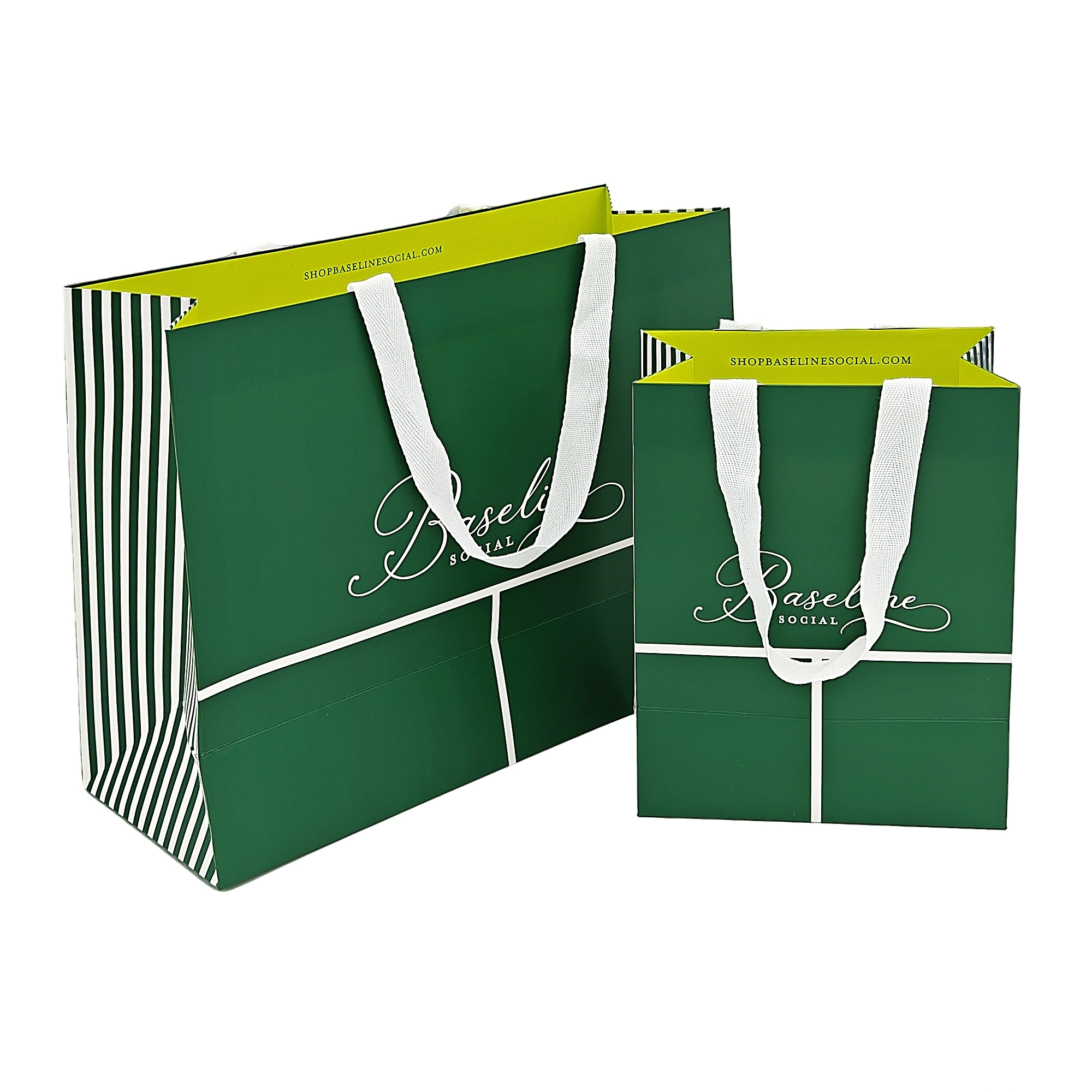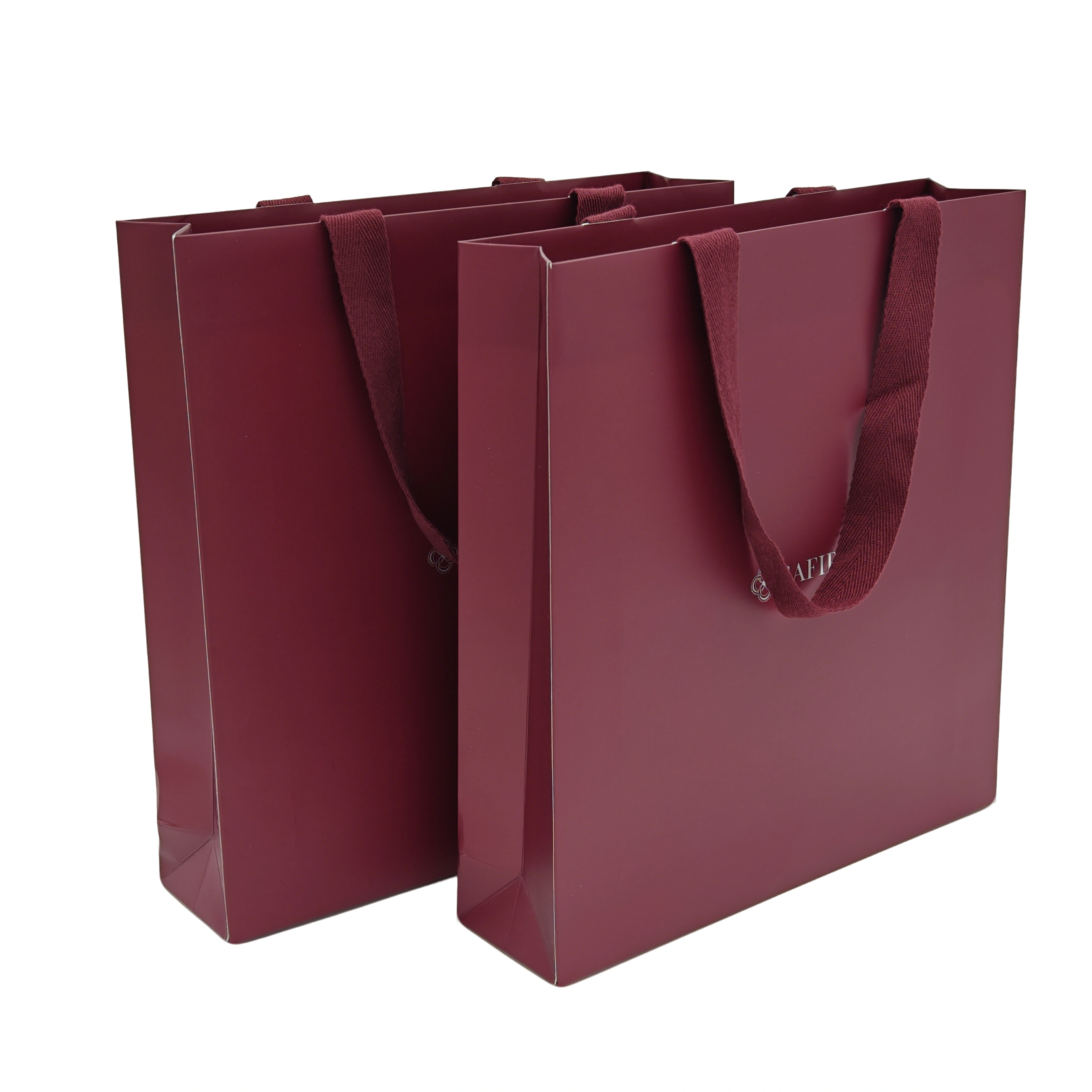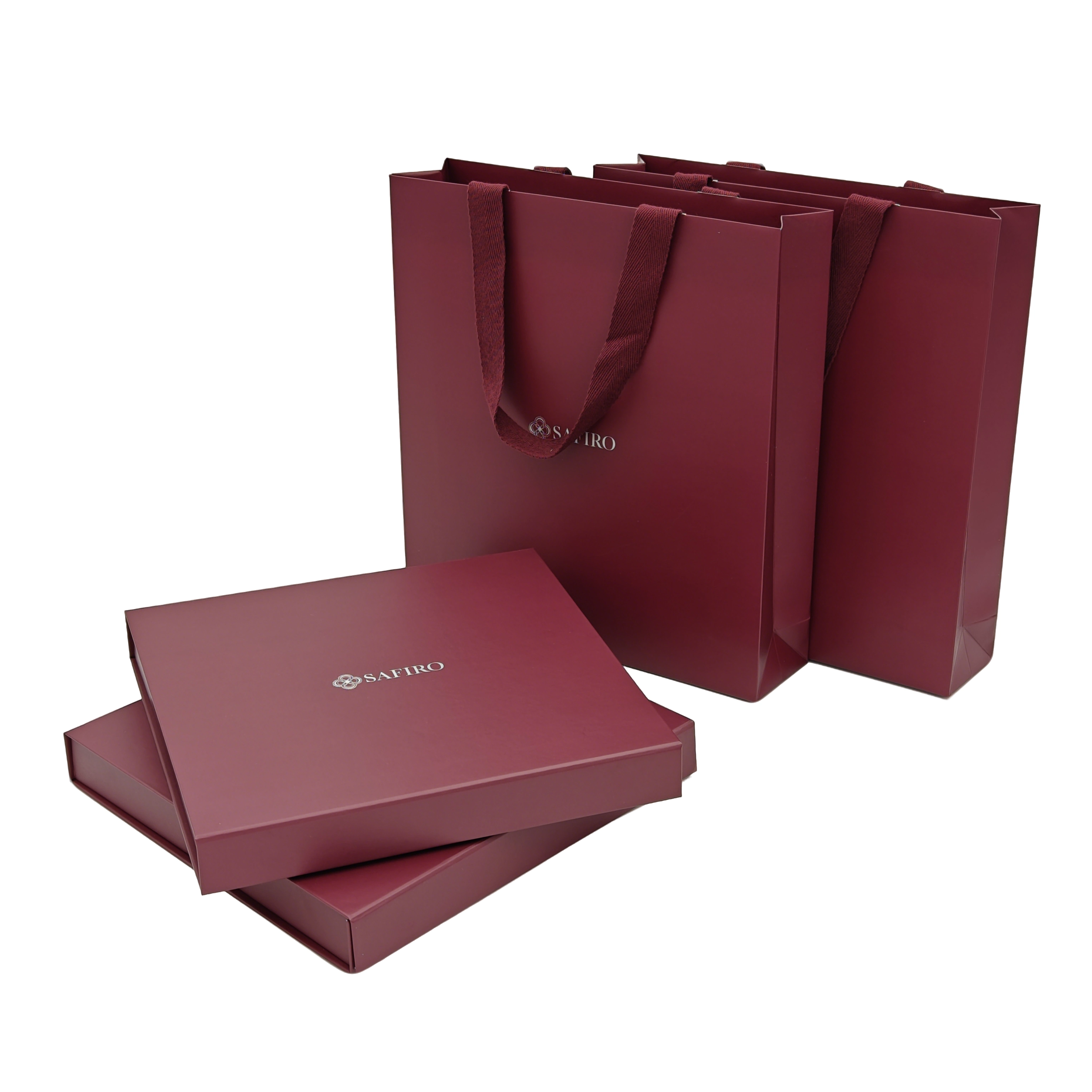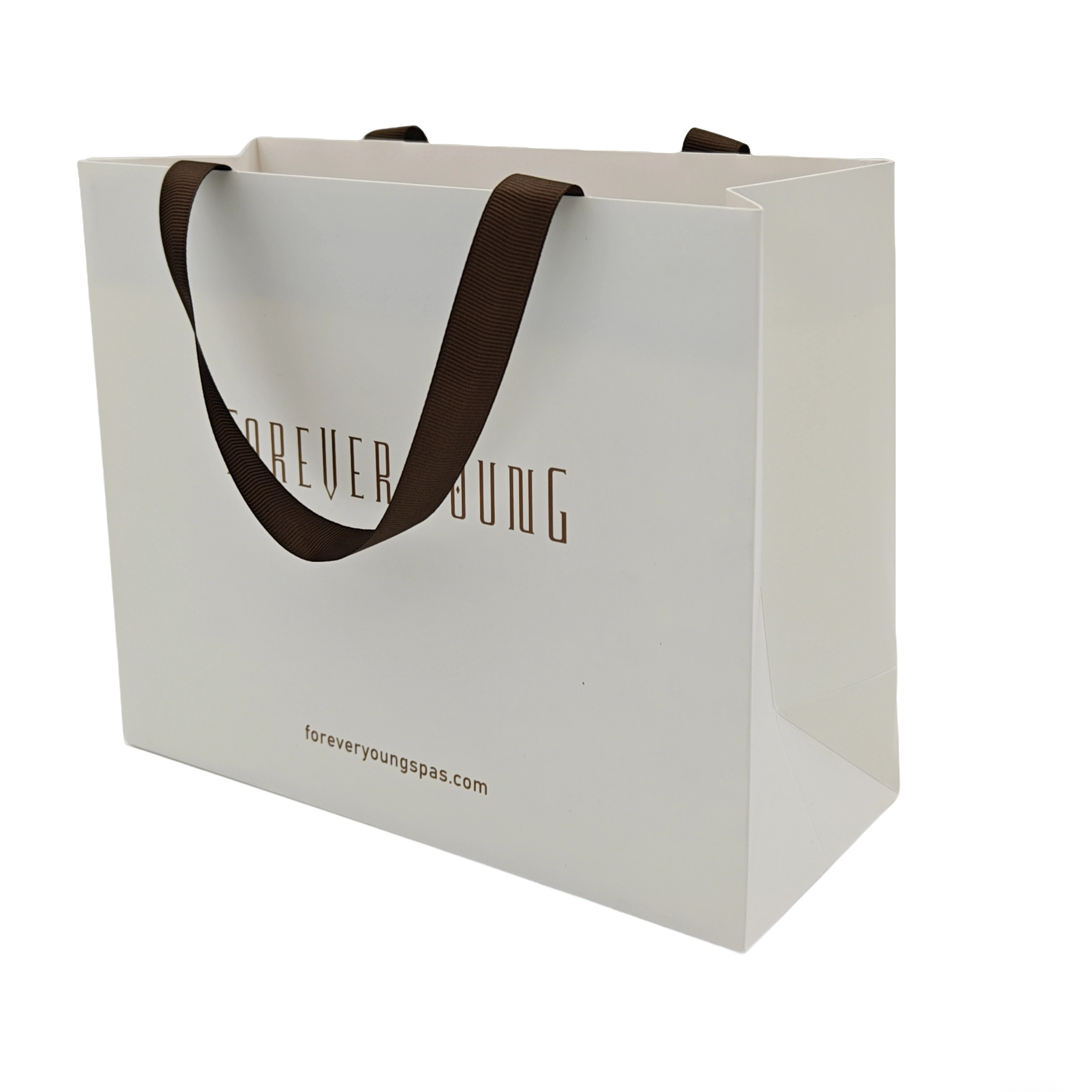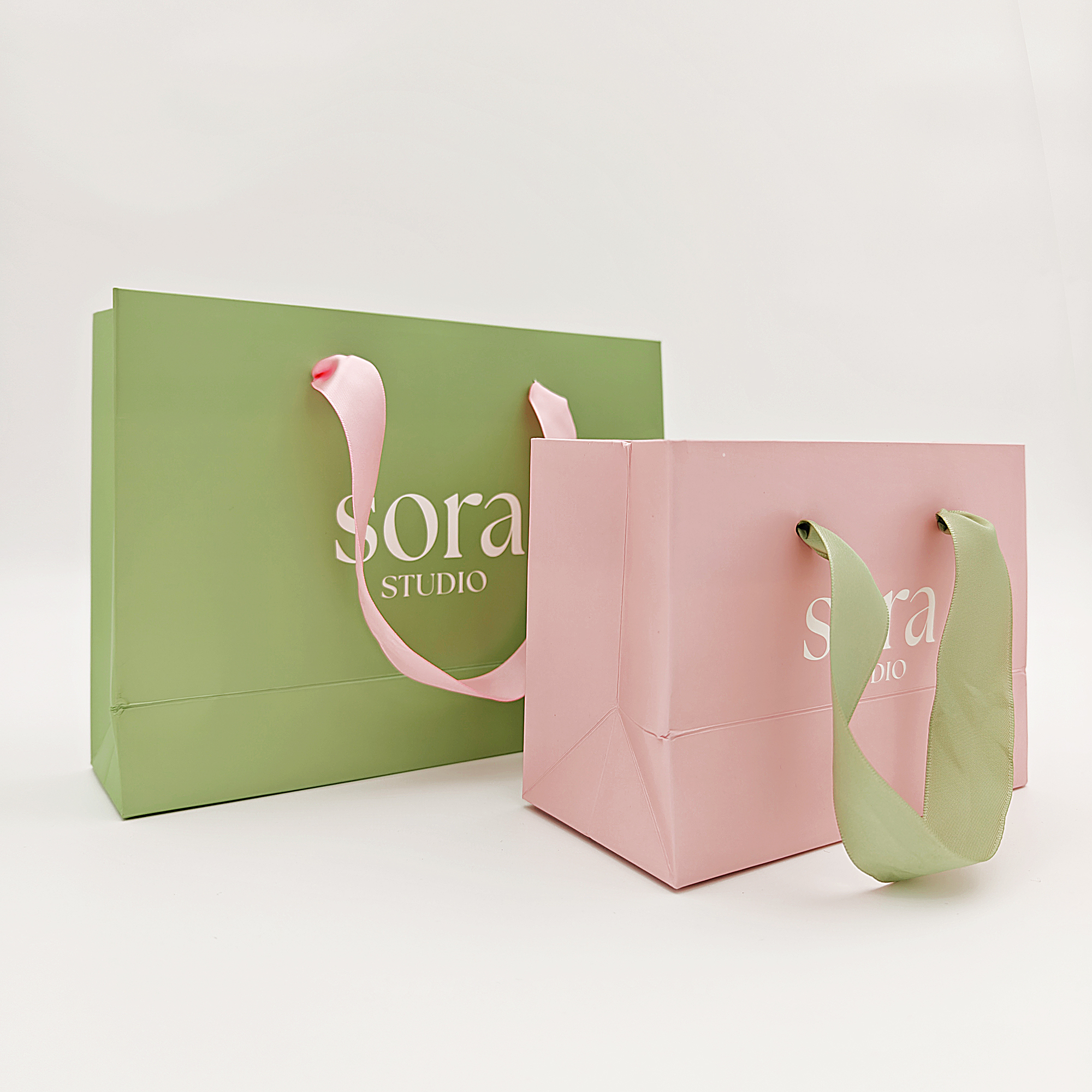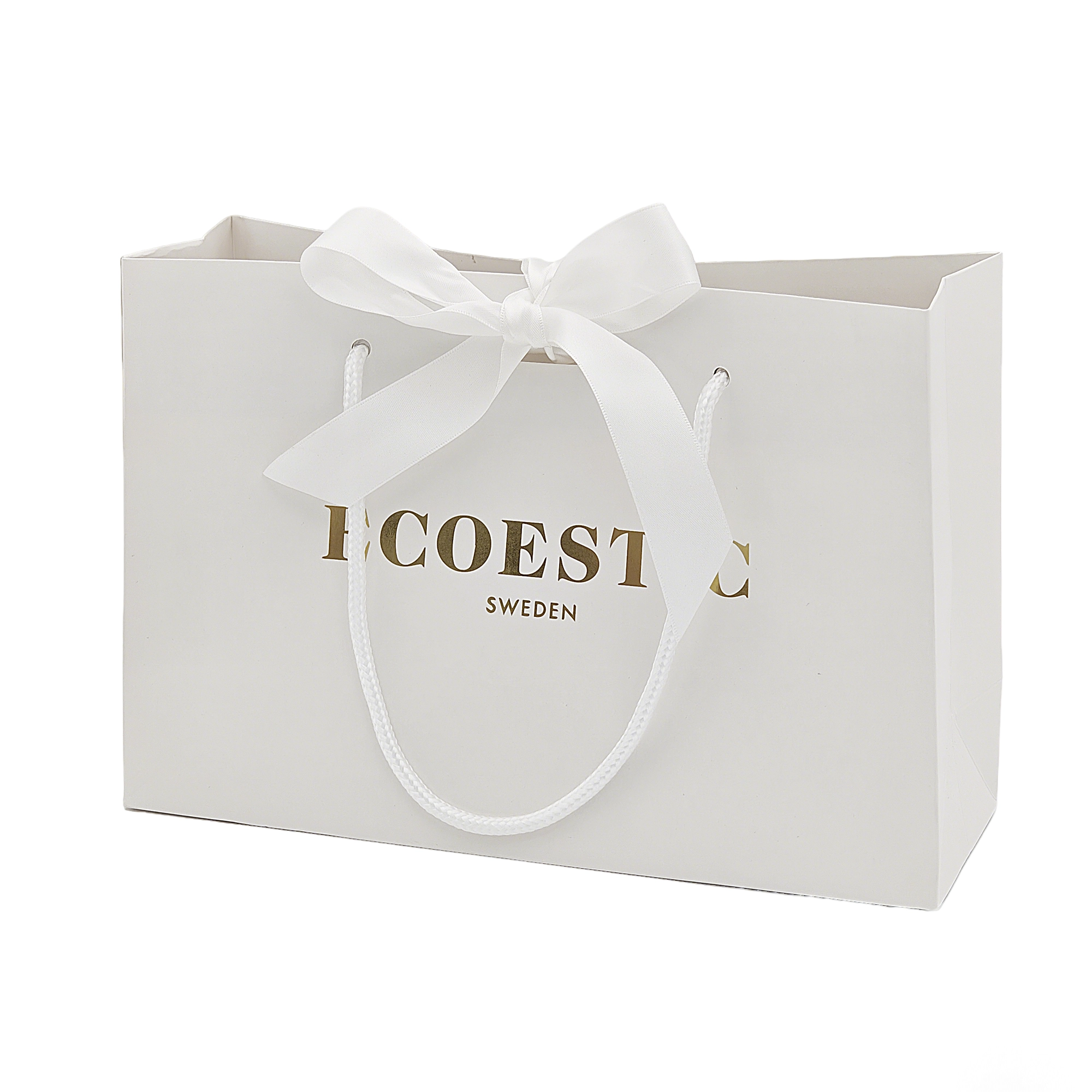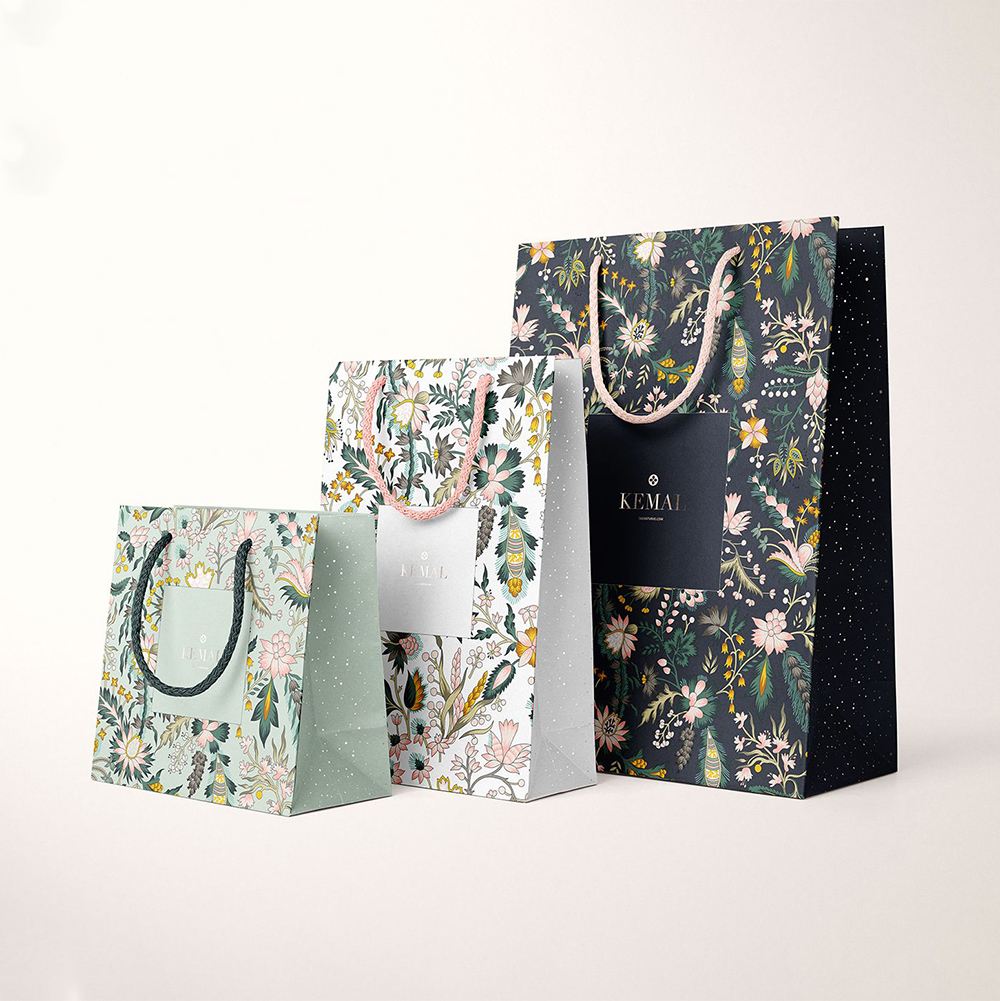Paper Carry Bags with Fabric Handles
Material: Ivory Card, Art Paper, C1S, C2S, Kraft Paper, Special Paper etc.
Feature: Handmade, Recyclable, Eco-Friendly, Strong Bearing Capacity
Rope material: cotton rope, hemp rope, nylon rope
Rope thickness and length can be customized
Printing Handling: Matt Lamination, Varnishing, Stamping, Embossing, Glossy Lamination
Custom Logo Treatment: Gold Foil/Stamping, Spot UV, Embossing, Debossing etc.
Size of bag: Custom
Advantage: OEM & ODM
Sample time: 5-7 days
MOQ: 500
For those seeking a balance of practicality and sophistication, paper totes with fabric handles are the perfect choice, whether for presenting gifts, packaging retail products, or promotional giveaways.
These paper totes with fabric handles are a sophisticated take on high-end products. The simple, classic construction of the paper tote is complemented by the tactile, bright fabric handles, creating a stunning visual statement. Available in a wide range of fabrics and colors, these totes can be customized to suit any brand aesthetic or event theme.
Parameter

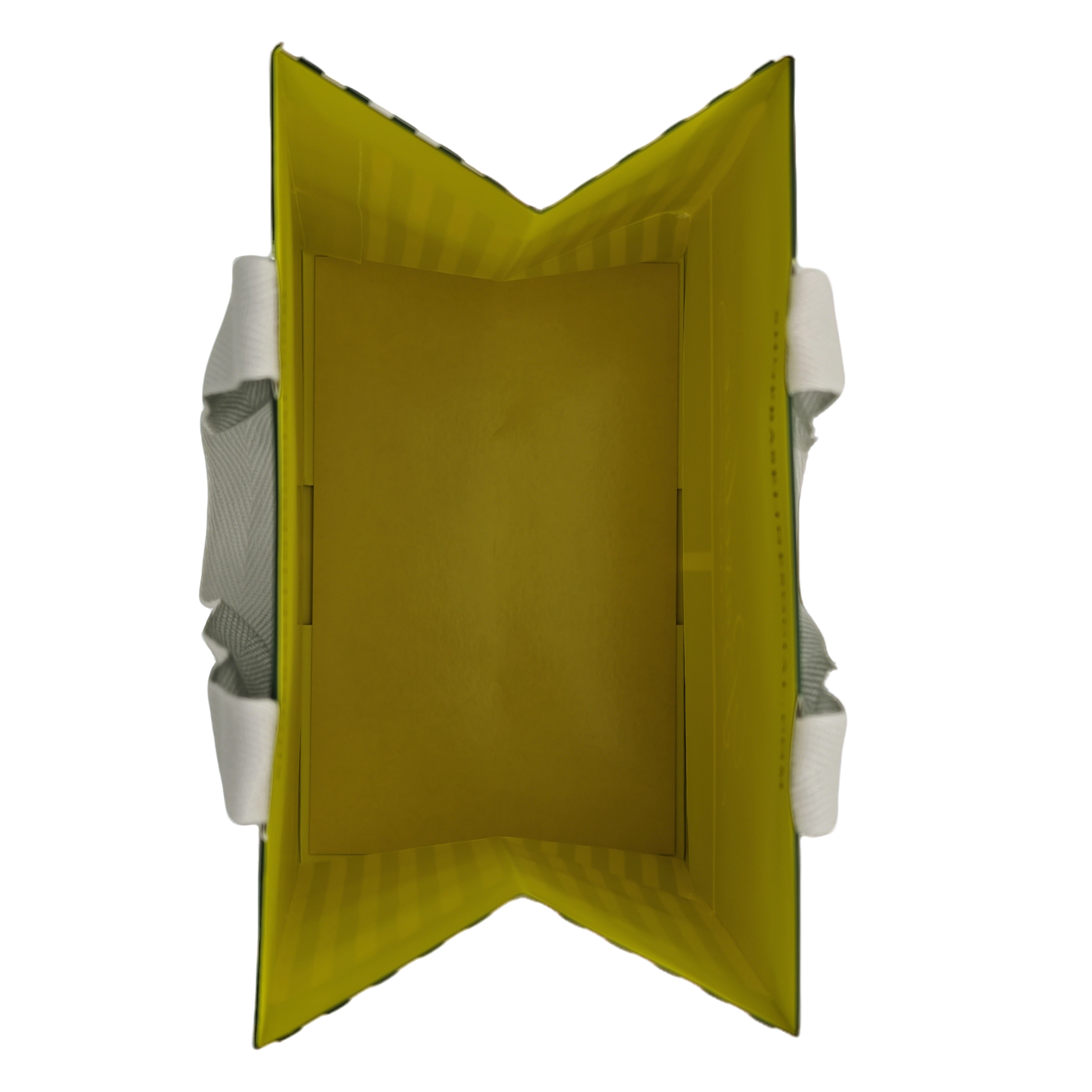
— The Core Advantages of Paper Carry Bags with Fabric Handles
The core advantages of fabric handle paper tote bags can be summed up in the formula "environmentally friendly materials + durable and practical + comfortable experience + brand customization." These four elements work in harmony to create a packaging solution that stands out in today's competitive market.
1. Environmentally Friendly Materials
Fabric-handle paper tote bags are a paragon of sustainability. The paper body of these tote bags is typically crafted from recycled or FSC (Forest Stewardship Council)-certified paper, ensuring that the raw materials come from responsibly managed sources. This not only reduces the demand for virgin wood pulp but also minimizes deforestation. Additionally, paper is highly recyclable, allowing these bags to be repurposed multiple times before being finally disposed of in an environmentally friendly way.
When it comes to the fabric handles, natural materials such as cotton, linen, or jute are often used. These materials are biodegradable, meaning they break down naturally over time without leaving harmful residues in the environment. For example, a cotton-handled paper tote bag can decompose within a few months in a composting environment. By choosing fabric-handled paper tote bags, brands and consumers are making a conscious choice to support a circular economy and reduce their environmental footprint.


2. Durable and Practical
One of the most significant drawbacks of traditional paper bags is their limited durability. Their handles are prone to tearing under heavy loads, making them unsuitable for carrying heavier items. Fabric-handled paper tote bags, however, overcome this issue. The fabric handles, whether made of sturdy cotton webbing, strong nylon, or resilient canvas, can bear a much greater weight. They can easily support items weighing 10-15 kilograms, compared to the mere 5 kilograms that traditional paper-handled bags can handle.
This enhanced durability makes them ideal for a wide range of applications. In a bookstore, customers can carry a stack of hardcover books without the fear of the handle breaking. In a grocery store, shoppers can load up on canned goods, bottles, and other heavy items. Moreover, the fabric handles are less likely to fray or wear out over time, even with repeated use. This practicality means that consumers can reuse these bags multiple times, reducing the need for single - use packaging.
3. Comfortable Experience
The fabric handles of these tote bags offer a level of comfort that traditional paper handles simply cannot match. Unlike the thin, sharp edges of paper handles that can dig into the hands and cause discomfort, especially when carrying heavy loads, fabric handles are soft and flexible. They distribute the weight evenly across the hand, minimizing pressure points and reducing fatigue.
For instance, a wide - width canvas handle provides a cushioned feel, making it easy to carry the bag for extended periods. The texture of the fabric also adds to the tactile experience. A cotton handle has a smooth, natural feel, while a jute handle offers a rustic, earthy touch. This comfortable experience encourages consumers to use the bags more often, which in turn increases the brand's exposure and the bag's lifespan.


4. Brand Customization
Fabric handle paper tote bags offer unparalleled opportunities for brand customization. The fabric handles can be customized in a variety of ways, including through color-matching, printing, embroidery, and embossing. Brands can choose to print their logos, taglines, or unique designs on the handles, creating a distinctive visual identity.
For luxury brands, an embroidered logo on a silk-like fabric handle can add an element of elegance and exclusivity. For eco-friendly brands, a simple, natural-colored fabric handle with a minimalist printed logo can convey a message of sustainability. This level of customization not only makes the bag a functional packaging item but also a powerful marketing tool. When consumers carry these bags around, they become walking advertisements for the brand, increasing brand awareness and visibility.
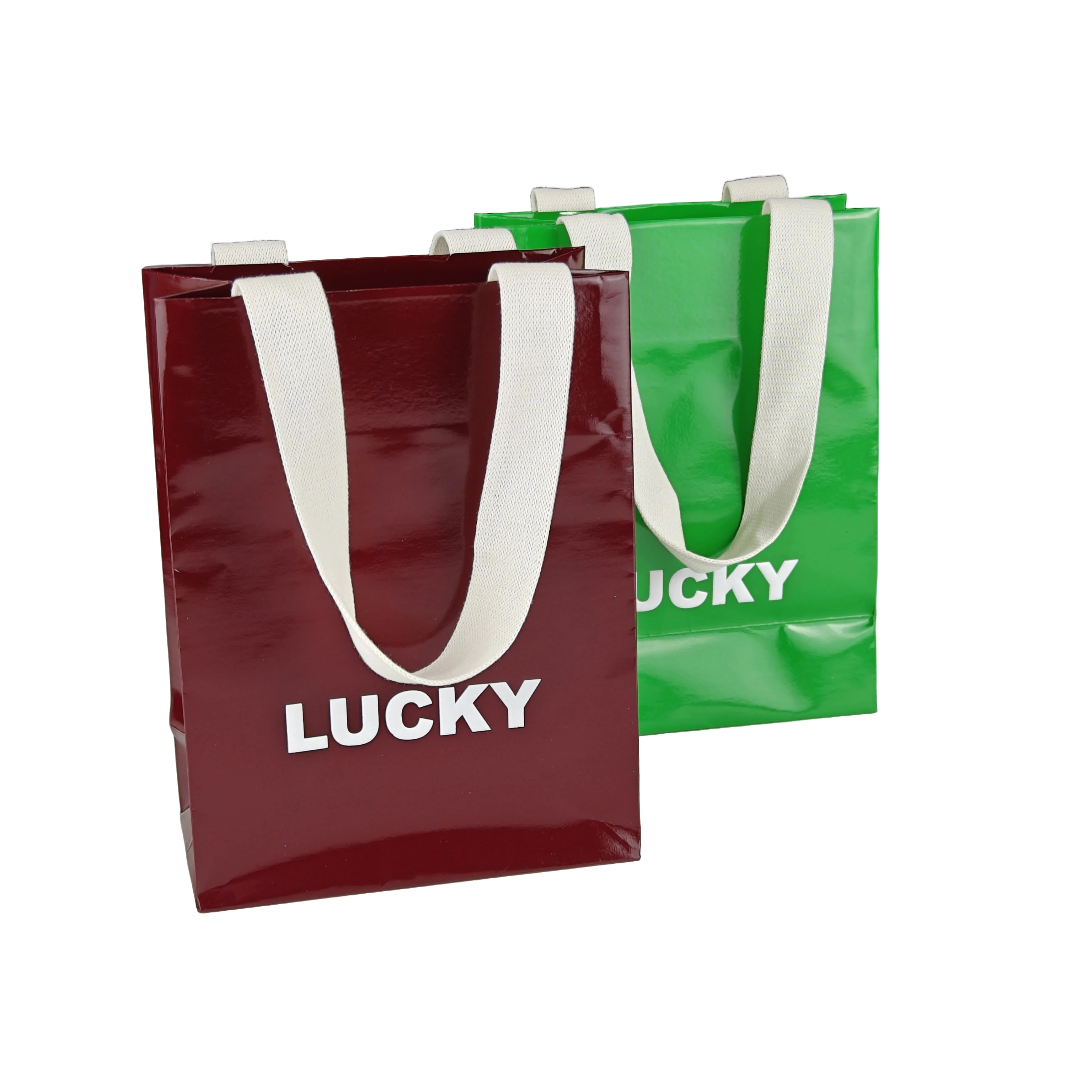
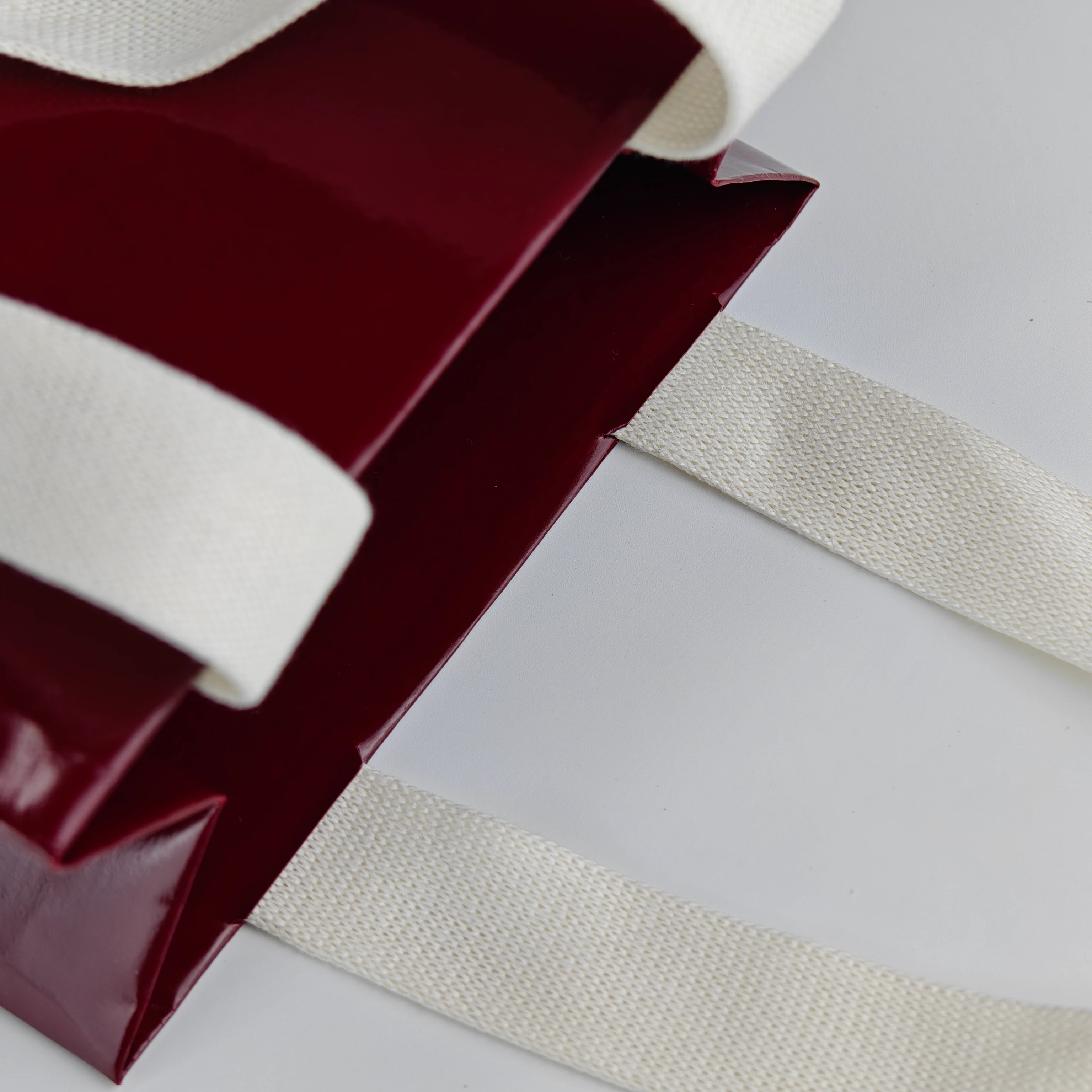
In conclusion, fabric-handle paper tote bags not only solve the functional defects of traditional paper bags but also meet the needs of brands and consumers for "practical, environmentally friendly, and beautiful" through design upgrades. They represent a perfect blend of functionality and communication, making them an increasingly popular packaging choice across various industries. From the moment a brand chooses a fabric handle paper tote bag, it is making a statement about its values, quality, and commitment to both the customer and the environment.
These FSC luxury paper bags feature soft cotton herringbone handles bonded to the top fold of the bag. This stylish handle adds a touch of elegance. This thoughtful design not only ensures durability for carrying heavier items but also incorporates a touch of sophistication, making every carry a stylish statement.
What sets these totes apart is their commitment to sustainability. They are fully recyclable and biodegradable, minimizing their impact on the environment. FSC certification guarantees that the paper used in production comes from responsibly managed forests, balancing environmental protection with social and economic benefits.


-
 Wechat
+8613616008761
Wechat
+8613616008761 -
 Email
Email
-
 Tel
+86-136-1600-8761
Tel
+86-136-1600-8761

 en
en es
es ru
ru fr
fr de
de it
it ja
ja ar
ar pt
pt ko
ko tr
tr nl
nl fi
fi